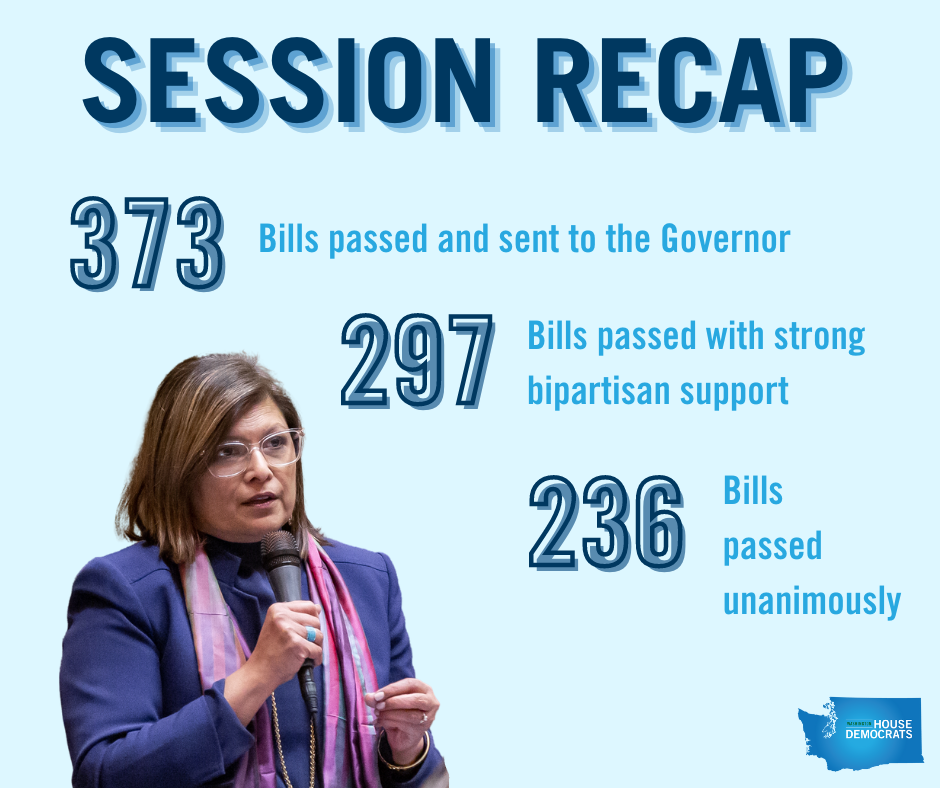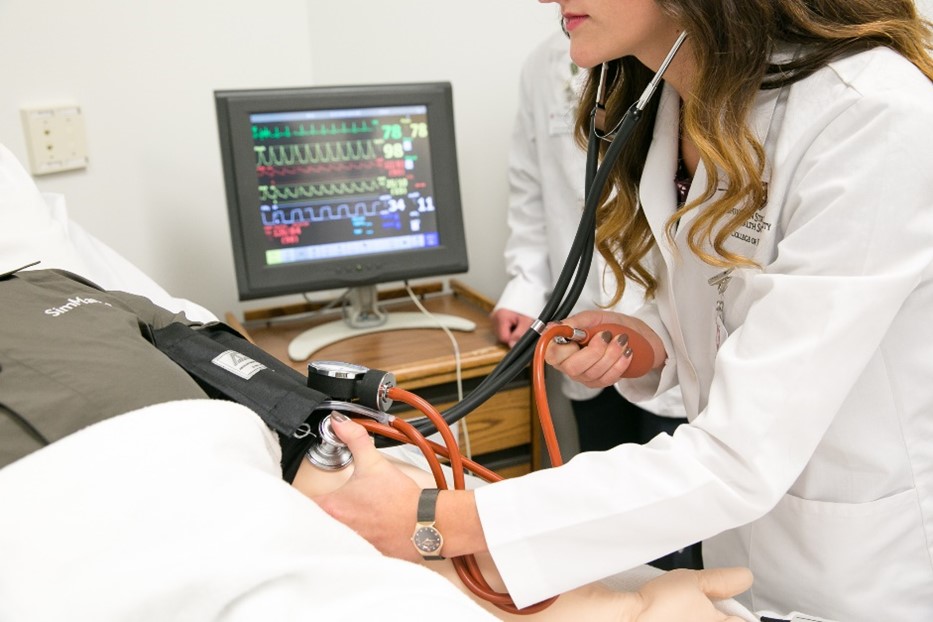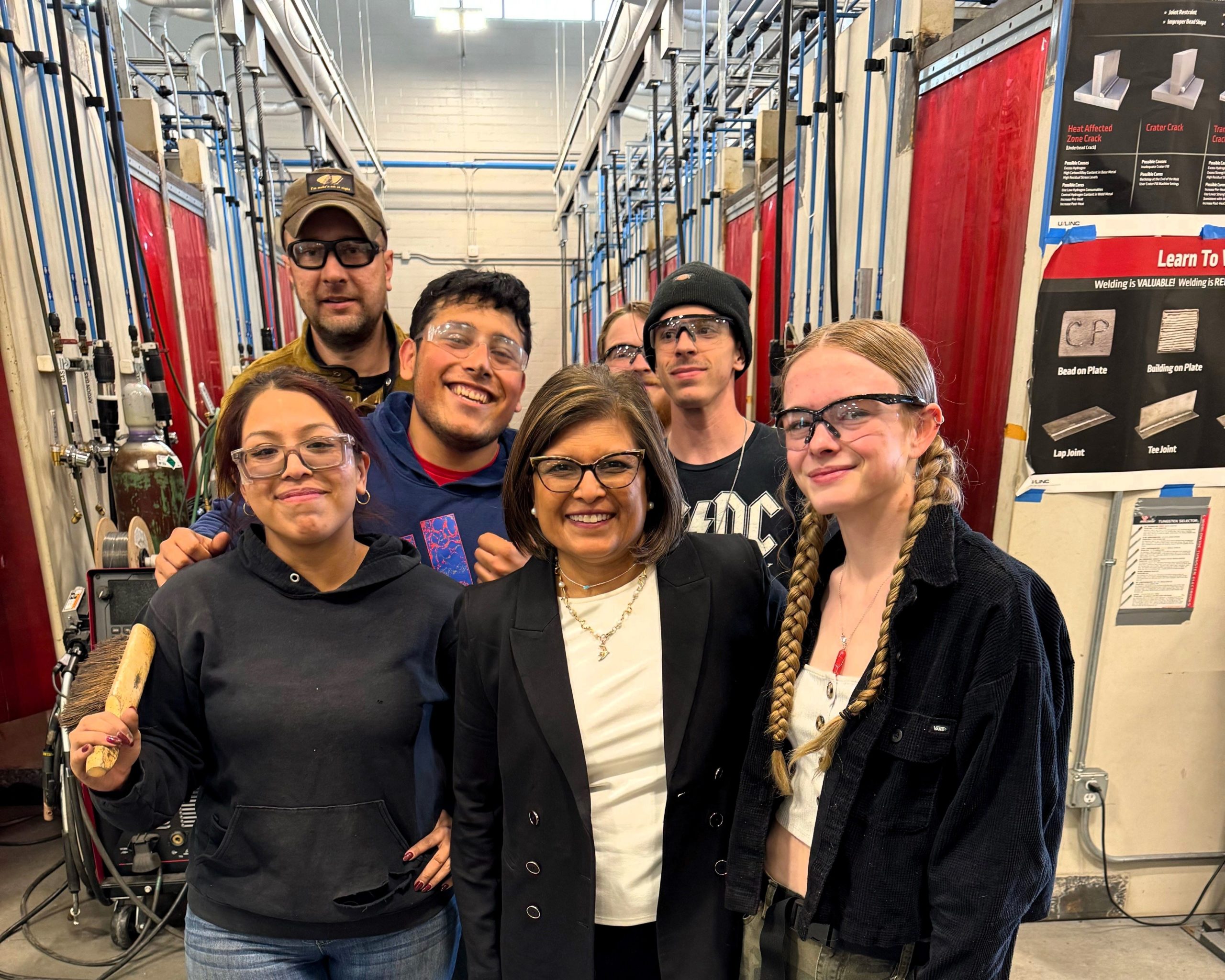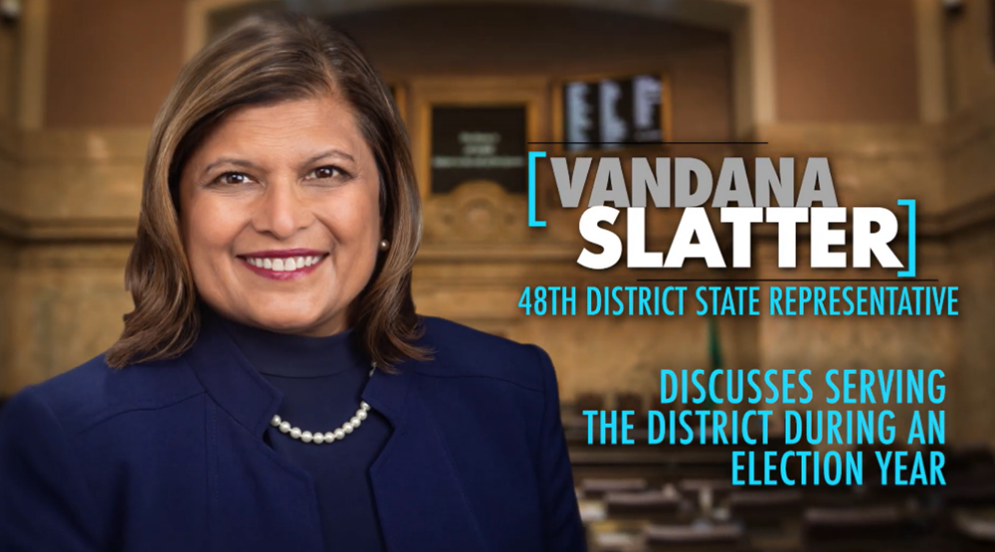Dear friends and neighbors,
I’m pleased to share that the 2024 legislative session concluded successfully in March. We achieved our goals of delivering balanced budgets, supporting working families, and by not imposing new taxes.

This year’s supplemental budgets maintain a steadfast focus on ensuring Washington’s families and all our communities have the resources needed to thrive. Our budgetary decisions are informed by the voices of community members throughout the state and are grounded in our core values. Below, I’ve outlined key highlights from each budget for your understanding and consideration.
OPERATING BUDGET
Behavioral Health: $245 million allocated to expand inpatient capacity, enhance rates for long-term civil commitments, and provide personal care for individuals with exceptional needs. Additionally, funding for diversion and outpatient care has been increased. There are significant needs in behavioral health state-wide and it continues to be a priority area for investment.
Fentanyl & Opioid Response: $215 million directed towards combatting the fentanyl and opioid crisis through enhanced access to treatment, public health awareness initiatives, providing naloxone and prevention awareness on school and college campuses, and support for tribal communities. This session we worked hard to address the opioid and fentanyl crisis that has been leading to tragic outcomes in families and communities throughout our state. To learn more about to prevent overdoses and find naloxone near you, click here.

Health Care & Public Health: A total of $444 million is earmarked to improve health outcomes, expand Medicaid Transformation Project initiatives, and promote health equity for uninsured adults. By expanding healthcare coverage, Washington can provide better access to primary home- and community-based care, and address health-related social needs. This will reduce healthcare costs and help families stay healthy.
Children, Youth & Families: $115 million dedicated to expanding early support for infants and toddlers, increasing childcare slots and eligibility, and boosting provider rates and reimbursements. By prioritizing this investment, we not only support a healthy future generation, working families, and strengthen our workforce and economy.
K-12 Education: $335 million allocated to increase funding for special education, free student meals, paraeducator support, and schools’ operating costs, ensuring equitable access to resources.
Higher Education & Workforce Development: $135 million directed towards expanding workforce training programs and student support services to meet the demands of the knowledge-based economy.

Homelessness & Housing: $230 million allocated to address the housing affordability crisis, supporting low and moderate-income households, local homeless services, and tenants’ rights.
Climate, Clean Energy & Natural Resources: A total of $335 million dedicated to preserving biodiversity, enhancing forest health, improving water quality, and promoting clean energy initiatives.
Public Safety, Legal Aid & Corrections: $70 million allocated to law enforcement training, reentry programs, and victim compensation to ensure community safety and support crime victims.
Additional notable investments that I was proud to sponsor or support:
- $8 million for digital equity, literacy, and broadband access.
- $426,000 to recruit, train, and retain healthcare professionals in rural and underserved communities through Area Health Education Centers.
- $330,000 for the Kindering Cherish early youth development program in Bellevue, specifically identifying infant and children’s developmental needs by supporting them through a proven home visitation program. This program was at risk of being discontinued this year.
- $300,000 to create a pilot Entrepreneur-in-Residence program for graduate students at CoMotion and the University of Washington in support of immigrant entrepreneurs and small business leadership.
- $250,000 to expand community service centers in Bellevue to help low-income individuals and immigrant and refugee community members.
CAPITAL BUDGET
 The $1.3 billion supplemental construction budget is dedicated to funding essential projects and infrastructure across the entirety of our state. It places significant emphasis on addressing the shortage of affordable housing and meeting the urgent demand for behavioral health facilities.
The $1.3 billion supplemental construction budget is dedicated to funding essential projects and infrastructure across the entirety of our state. It places significant emphasis on addressing the shortage of affordable housing and meeting the urgent demand for behavioral health facilities.
Behavioral Health: $82.7 million for behavioral health community capacity grants and expanded investment in tribal behavioral health centers.
Affordable Housing: $127.5 million investment in the Housing Trust Fund to address the need for affordable housing.
Public School Construction: $1.3 billion allocated to fund vital projects including support for local schools, skill centers, and career/technical education.
Local Construction Projects: Funding for various projects including early learning facilities, affordable housing development, and community arts programs:
- $2.3 million for the expansion of early learning facilities at Brightonview Childcare.
- $3.2 million from the Housing Trust Fund to provide affordable and permanent supportive housing from Kenmore to Redmond as part of the Plymouth Housing Project.
- $4.2 million to develop a transit-oriented housing development for supportive housing projects in Redmond.
- $350,000 for KidsQuest Children’s Museum to teach stories of water.
- $100,000 for renovations to the nonprofit Redmond Theater of the Arts, enhancing access to community arts programs for young children.
TRANSPORTATION BUDGET
 The $14.6 billion 2024 Supplemental Transportation Budget demonstrates a strong commitment to climate action by prioritizing substantial funding from the Climate Commitment Act (CCA), amounting to over $300 million. This funding is dedicated to a variety of initiatives aimed at reducing carbon emissions, addressing pollution that diminishes our health, and advancing clean transportation solutions. Specifically, the budget allocates resources for electric school buses, electric vehicle charging infrastructure, enhancements to public transit, and the implementation of pedestrian safety measures such as sidewalks and bike lanes. Moreover, underserved, and tribal communities receive targeted assistance to ensure equitable access to these clean transportation solutions.
The $14.6 billion 2024 Supplemental Transportation Budget demonstrates a strong commitment to climate action by prioritizing substantial funding from the Climate Commitment Act (CCA), amounting to over $300 million. This funding is dedicated to a variety of initiatives aimed at reducing carbon emissions, addressing pollution that diminishes our health, and advancing clean transportation solutions. Specifically, the budget allocates resources for electric school buses, electric vehicle charging infrastructure, enhancements to public transit, and the implementation of pedestrian safety measures such as sidewalks and bike lanes. Moreover, underserved, and tribal communities receive targeted assistance to ensure equitable access to these clean transportation solutions.
In addition to the CCA funding, the budget maintains its focus on funding major transportation projects and invests in road preservation and maintenance to safeguard the longevity of our existing infrastructure. We’ve also prioritized investments in multi-modal transportation systems, exemplified by projects like the Puget Sound Gateway Project, replacing the SR-520 bridge, and improving our ferry system. Furthermore, funding is allocated for repairs to fish passages and ongoing highway maintenance.
These investments are not only vital for the future of transportation in our state but also ensure that communities, including those in the 48th District, benefit from enhanced connectivity and sustainable infrastructure.
Local Transportation Projects
- $14 million for construction of multi-use paths, and trail infrastructure for the Mountains to Sound Greenway.
- $2.67 billion for the 2012-2016 replacement of the SR-520 floating bridge.
- $18 million for rehabilitation of the Wilburton Trestle and I-90 steel bridge.
- $800,000 for Bellevue and Redmond to replace two diesel fire engines with two electric engines.
Ferries
Our “highway in the ocean” has been historically underfunded; while these investments are good news, they will take time to implement.
- $196 million in CCA funds for hybrid electric vessel construction and terminal electrification.
- $73 million in 2023-25 to cover cost increases for hybrid vessel construction.
- $22.9 million for increased staffing, workforce development, and increased service.
Climate Commitment Act
- $40 million for public/private initiatives to switch to zero-emissions technology through commercial vehicle vouchers, alternative fuel charging infrastructure, car share programs and more.
- $35.5 million for rail/port electrification.
- $30 million for public transportation electrification.
- $33 million for Local Programs, including pedestrian/bicycle infrastructure and local electrification initiatives.
- $4 million for electric school buses.
- $12 million for zero emissions vehicle supply equipment.
Traffic Safety
- $8.5 million for public education and enforcement efforts, and to increase grants to local jurisdictions and community-based organizations for projects such as improving bike, pedestrian, and school zone safety.
- $4.2 million to reduce accidents and improve road safety programs.
- $1 million to develop a highway speed safety camera pilot program.
Washington State Patrol
- $6.2 million to restore vacancy savings.
- $5.9 million for additional trooper training.
- $691,000 for WSP to retain seasoned troopers.
If you want more details on any of the budgets, including project maps and lists, please visit our state’s fiscal information website:
Resources For Individuals, Students, & Families
As we enter the summer, many individuals, students, and families continue to experience hardship. Below are some resources, that in addition to contacting my office, may be useful:
- Temporary Assistance for Needy Families (TANF): https://www.dshs.wa.gov/esa/community-services-offices/tanf-and-support-services
- Basic Food (SNAP): https://www.dshs.wa.gov/esa/community-services-offices/basic-food
- Find your closest food bank: https://www.parenthelp123.org/
- If you are experiencing homelessness or the threat of losing your housing, emergency housing resources are available here: https://wa.gov/how-to-guides/housing-assistance and https://www.dshs.wa.gov/altsa/stakeholders/housing-resources
For prospective students, the only way to qualify for financial aid for college or career training is to complete the FAFSA, or in limited cases the WASFA.
Despite some challenges with the new FAFSA form, it’s worth completing your application now because:
- The form is shorter and easier! Applying is the only way to know how much money you can get.
- More money is available! More people are eligible to receive federal Pell Grants, and the average grant is expected to be larger.
- Washington State aid is generous and flexible! The WA Grant program gives eligible people more money for more types of education like certificate programs, job training, apprenticeships, or college—and the FAFSA is the first step for that, too.
Don’t give up! Colleges know some people are running into issues with the FAFSA and many are being flexible.
- FAFSA 2024-25 Updates page: https://wagrant.org/fafsa
- WA Grant page: https://wagrant.org
- Apply page: https://wsac.wa.gov/apply
- Financial aid calculator: https://portal.wsac.wa.gov/a/aid-calculator/
- Financial aid events: https://wsac.wa.gov/financial-aid-events
Thank You!
Your engagement with my e-newsletters is truly appreciated, and I hope you find them a helpful resource and informative. A comprehensive review of the 2024 legislative session is available online as well.
As we enter an election year, it’s important to adhere to certain restrictions on public communications to ensure that state resources are not utilized for campaign purposes. Consequently, newsletters will be paused, and there will be a freeze on my website and social media starting from May 6 until after the general elections are certified in the Fall. You can learn more by clicking here or on the image above.
However, I will continue to serve you and our community during this time. My office remains open and available to assist you with any legislative inquiries, connecting you with state agencies and services. You can also send me an email to share your thoughts on issues that matter most to you. Your input is invaluable, and I am here to address any issues that are important to you.
It is a privilege to bring my experience as an Indian American woman, mom, clinical scientist, and licensed pharmacist to the legislative process. Thank you for all you do!
In Service,

State Representative Vandana Slatter



